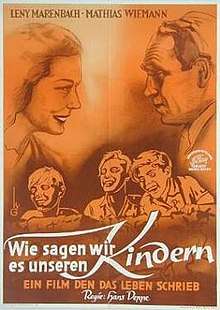How Do We Tell Our Children?
How Do We Tell Our Children? (German: Wie sagen wir es unseren Kindern?) is a 1949 German comedy film directed by Hans Deppe and starring Leny Marenbach, Mathias Wieman and Hilde Körber.[1] The film was made by the major German studio UFA in 1944, but was not released until several years after the end of the war.[2]
| How Do We Tell Our Children? | |
|---|---|
 | |
| Directed by | Hans Deppe |
| Produced by | Erich Holder |
| Written by |
|
| Starring | |
| Music by | Hans-Otto Borgmann |
| Cinematography | Robert Baberske |
Production company | UFA |
| Distributed by | Stern-Film Verleih |
Release date | 21 December 1949 |
Running time | 89 minutes |
| Country | Germany |
| Language | German |
The film's sets were designed by the art director Wilhelm Vorwerg. Shooting took place in the Babelsberg Studios and on location in Dresden and Switzerland.
Synopsis
In a suburb of Dresden, a widowed doctor with four children lives opposite a divorcee with three children. Gradually they fall in love despite the constant feuding between their children.
Cast
- Leny Marenbach as Käthe Westhoff
- Mathias Wieman as Dr. Thomas Hofer
- Hilde Körber as Adele
- Ernst Waldow as Diesing
- Babsi Schultz-Reckewell as Sigrid
- Edmund van Kann as Klaus
- Jürgen Tusch as Wölfchen
- Hans-Dieter Gotzmann as Erich
- Herbert Stetza as Theo
- Hans Neie as Kurt
- Jürgen Peter Jacoby as Pepi
- Franz Schafheitlin
- Alexa von Porembsky
gollark: We should send flat earthers to space as test pilots.
gollark: Nice wiki software.
gollark: Heresy!
gollark: The horizon is a fuzzy line more than an actual clear border.
gollark: No it doesn't.
See also
References
- Holmstrom p. 523
- Rentschler p. 268
Bibliography
- Holmstrom, John. The Moving Picture Boy: An International Encyclopaedia from 1895 to 1995, Norwich, Michael Russell, 1996.
- Rentschler, Eric. The Ministry of Illusion: Nazi Cinema and Its Afterlife. Harvard University Press, 1996.
This article is issued from Wikipedia. The text is licensed under Creative Commons - Attribution - Sharealike. Additional terms may apply for the media files.